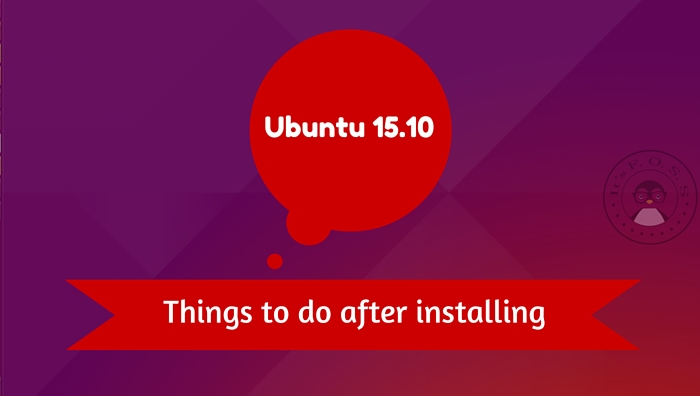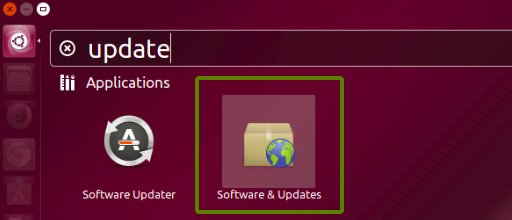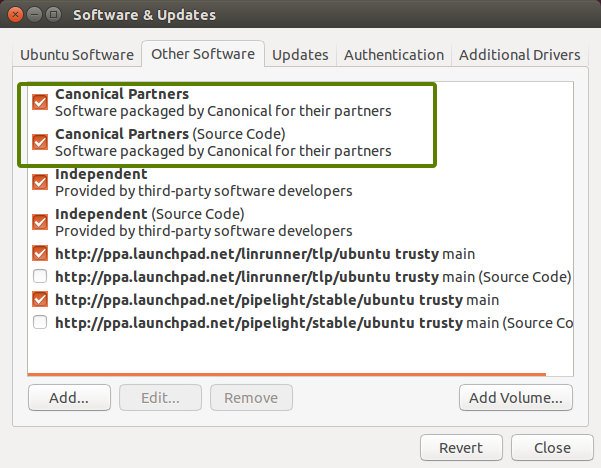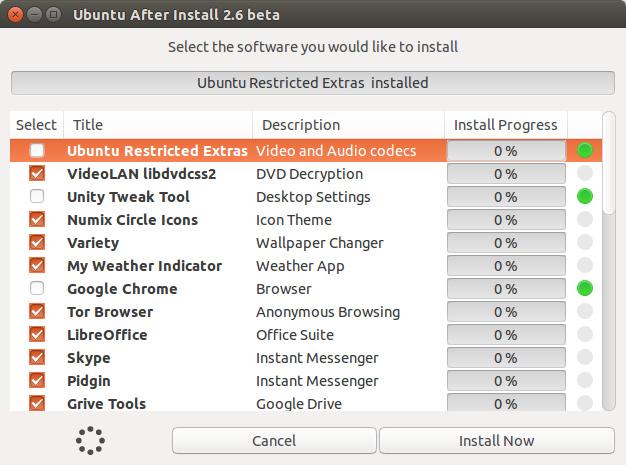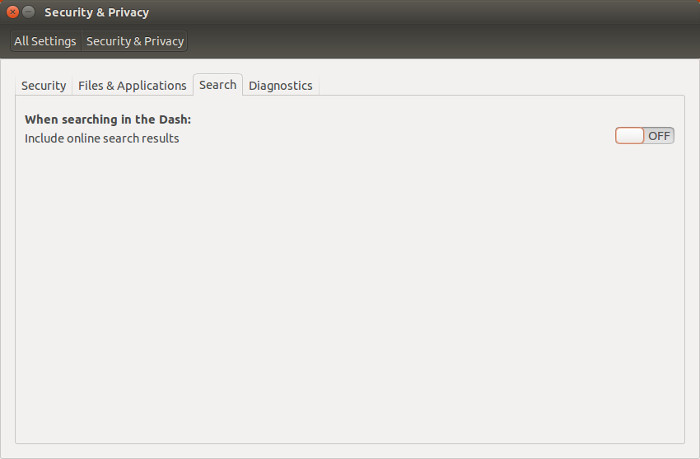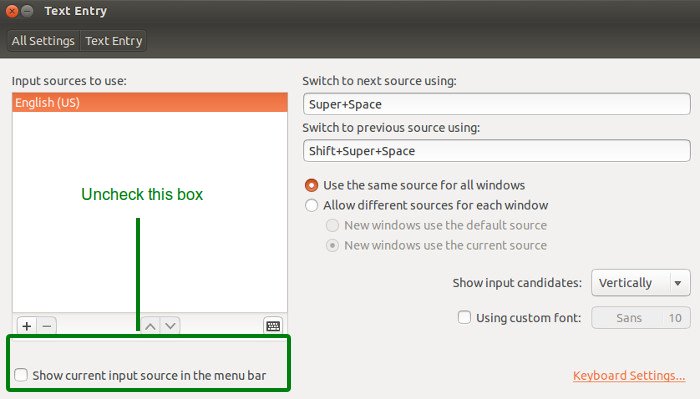While there might not be plenty of new features in Ubuntu 15.10, especially in terms of eye-candy but it doesn’t stop enthusiasts from trying it out. For anyone who likes the cutting edge technology, it should be a good enough reason to upgrade to Ubuntu 15.10. If you are doing a fresh install, here is a list of top things to do after installing Ubuntu 15.10 to have a smoother and better desktop experience with it.
Suggested Read: Check out the list of things to do after installing Ubuntu 16.04.
Things to do after installing Ubuntu 15.10
I’ll detail most of the steps as it helps beginners. But if you are a seasoned Ubuntu user, you perhaps will be better off with just the commands. For the ease of following this longs article, I have categorize it in various parts. Hope you would like it.
1. Prepare your system
As the first step, I advise to enable Canonical Partners repository in the Software Sources. Doing this will enable you to install several applications which are not available in the default repository.
Go to Unity Dash (hit Super/Windows key) and search for Software Sources.
Under the Other Software tab, check the box of Canonical Partners. This will reload the entire software source cache.
Next you need to do is to update your system. Open a terminal and use the following command:
sudo apt-get update && sudo apt-get upgrade2. Install essential applications in one click
Alright! It’s kind of cheating. This is not really a separate category because I’ll be listing various applications later in this article. However, I wanted to introduced this wonderful tool Ubuntu After Install (still in beta). This tool lets you install a number of essential applications in one click. It saves you the pain of adding PPAs (if required). If you use this tool, you will in fact save lot of time and energy. But this doesn’t mean you should skip this article altogether :)
Read how to install essential apps in one click after installing Ubuntu
3. System Tweaks
Time to do some tweaking. Let’s see what sort of systems tweaks you can do to get you started.
3.1 Get rid of shopping result in Unity Dash
Ever since this Amazon thing has been introduced in Ubuntu, I have never made a single purchase from it. In fact I never even used it for searching anything at all. I prefer to get rid of it as soon as possible. It just a hindrance to me. To remove the shopping results from Uniy Dash, go to System Settings -> Security & Privacy -> Search tab. In here you’ll see the option of turning off the shopping result:
3.2 Install Tweak Tool
I am assuming that you are using Ubuntu Unity. To tweak Unity, the best tool is Unity Tweak Tool. To install it use the following commands:
sudo apt-get unity-tweak-tool3.3 Install new icons and themes
Give your Ubuntu a different look by installing new themes and icons. Check this post to see how to install themes in Ubuntu. You can also check the best icon themes for Ubuntu.
3.4 Create wallpapers slideshow
You can easily change the background wallpapers in Ubuntu 15.10. But you’ll need to install an application to make the wallpaper slideshow of custom wallpapers. I suggest to use Wallch for this purpose. You can install it using the command below:
sudo apt-get install wallch3.5 Remove keyboard input from Unity Panel
Most of us might not have any need of switching keyboards layout. Therefore, they keyboard input in the Unity panel will be unnecessarily taking additional space. To remove it, go to System Settings-> Text Entry and uncheck the Show current input source in the menu bar.
4. Install media applications and codecs
You’ll be playing music, YouTube, movies and what not. Let’s see what you can do to better your media experience in Ubuntu.
4.1 Install media codecs
If you want to play media files such as MP3, MP4 etc, you’ll need to install respective media codecs for it. What you can do is to install Ubuntu Restricted Extras package which install a number of media codecs including Adobe Flash Player for you. Just use the following command:
sudo apt-get install ubuntu-restricted-extras4.2 Install VLC media player
Accept it. VLC is the king of media players. It can play almost all kind of media files flawlessly. Moreover, it is an Open Source product. To install VLC in Ubuntu 15.04, use the following command:
sudo apt-get install vlc4.3 Install podcast app Vocal
While the default music player Rhythmbox music player has podcast option, you can always do better with a dedicated podcast app, especially if it looks stunning. Read about how to install Vocal in Ubuntu 15.04.
4.4 Install Netflix of Piracy: Popcorn Time
If the law in your country and/or your conscience allows privacy, you can install Popcorn Time in Ubuntu to stream torrents in Netflix style. If you are installing it, do check these tips and tricks for Popcorn Time for a better experience.
4.5 Play DVD in Ubuntu
You can play DVD in Ubuntu 15.04 by installing some libraries withe commands below:
sudo apt-get install libdvdread4
sudo /usr/share/doc/libdvdread4/install-css.sh4.6 Install Spotify
To install Spotify in Ubuntu, use the commands below:
sudo sh -c 'echo "deb http://repository.spotify.com stable non-free" >> /etc/apt/sources.list.d/spotify.list'sudo apt-key adv --keyserver keyserver.ubuntu.com --recv-keys 94558F59sudo apt-get update sudo apt-get install spotify-client
5. Install cloud services
There are a number of cloud services available for Ubuntu (and Linux). If you want to install Dropbox, you can download the installer for Ubuntu from Dropbox website. If you are nearing the space limit on your Dropbox account, you can check Dropbox alternatives that provide more cloud storage for free. I suggest Copy that provides 15 GB of free storage and MEGA that provides 50 GB of free cloud storage.
Read: How to install Copy in Ubuntu.
6. Install messaging apps
6.1 Install Skype
If you had enabled the Canonical Partners repository, as described in first step, you should be able to install Skype in Ubuntu 15.04 by using the command below:
sudo apt-get install skype6.2 Install Telegram
WhatsApp’s secure alternative, Telegram has an official desktop client for Linux. You can install it via this unofficial PPA:
sudo add-apt-repository ppa:noobslab/apps
sudo apt-get update
sudo apt-get install telegram-desktop6.3 Install Viber
Yes, Viber too has official Linux desktop client. Though it’s available for only 64 bits system. You can obtain the installer from the official website here.
7. Install miscellaneous utilities
7.1 Install Java
You can love it, you can hate it but you cannot escape it. To install Java in Ubuntu, you can use the following command:
sudo apt-get install icedtea-7-plugin openjdk-7-jre
7.2 Install RAR
To install RAR, use the command below:
sudo apt-get install rar8. Improve battery life and reduce overheating
Common problem with laptops these days in overheating and lower battery life. To reduce overheating and subsequently increase battery life in long run, you can install TLP using the commands below:
sudo apt-get install tlp tlp-rdw
sudo tlp startYou don’t need to do anything else for TLP to work. It will be working in background always. You can read more tips to reduce laptop overheating in Ubuntu.
What else?
I know this is not a complete list of things to do after installing Ubuntu 15.10. There are so many things one can do. But it depends upon individual’s preferences. Therefore I leave the floor open for your suggestions. Do share what tweaks you do after installing Ubuntu.

